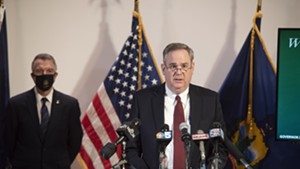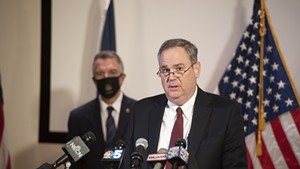
- Matt Mignanelli
As Vermont looks for a new leader at the Agency of Education, some critics are charging that the search has been rushed and halfhearted — in stark contrast to the considerable investment of time and money some Vermont school districts have made to find new local leaders in recent years.
After education secretary Dan French left his job in April to take a position at a national education nonprofit, Gov. Phil Scott waited almost four months to ask the State Board of Education to start searching for a successor.
The board's recruitment campaign this fall has been largely limited to posting the position on national education and job websites. The window to apply initially was supposed to be just three weeks, but the board recently extended the application deadline by one week, until October 12. A single, little-publicized online forum about the search drew only a small audience.
"I'm worried about it being a rushed process," said Jay Nichols, executive director of the Vermont Principals' Association. "I'm hoping we get national candidates."
State Rep. Laura Sibilia (I-Dover), a 20-year member of her local school board and an advocate for rural schools, also expressed concern.
"This is one of the most consequential and expensive systems our state government is responsible for administering," Sibilia wrote in an email, adding that the search process "does not match the seriousness of the current issues and undermines the public's trust in the process."
Among the issues that Nichols and other education leaders noted are post-pandemic teacher shortages, acute mental health challenges in schools, a declining student population and legal challenges to public education.
In responses to a recent survey, Vermont school administrators called for strong leadership to helm the Agency of Education. The school officials painted a bleak picture of an agency lacking in expertise and in need of an overhaul.
"From the field's perspective, the Agency of Education is broken," one respondent wrote. "There are people at the agency who are completely ineffective. The next secretary may need to clean house and build new."
Vermont's top education official oversees a $2.56 billion education system with 80,000 students. The person is responsible for ensuring that public and independent schools comply with state and federal statutes and policies and that all Vermont students have equitable access to high-quality education. The secretary, who will make approximately $168,000 annually, oversees a staff of around 170.
Despite the weighty responsibilities, Scott showed no urgency to kick off a search in April, when French departed.
State law requires the governor to write a letter to the state education board, asking its members to start a secretary search. But Scott didn't write that letter until July 26. The governor's spokesperson, Jason Maulucci, attributed the delay to a busy legislative session and then the all-consuming state response to widespread flooding in early July.
When the letter did arrive, it included the governor's suggestion that the board take eight weeks to conduct the search. Scott's communications director, Rebecca Kelley, added last week that the governor has told the board he would like to have a secretary in place by January and believes that, for now, "the Agency remains in good hands" under deputy education secretary Heather Bouchey, who has served as interim chief since April.
By the time the state board met, appointed a search committee and agreed on a job description, it was early September.
According to board chair Jennifer Samuelson, the committee, in consultation with the state Department of Human Resources, promoted the position on education job board SchoolSpring; national news organization Education Week; the state's online recruiting site, SuccessFactors; and through an Agency of Education press release issued on September 25.
Through the state's recruiting site, the job was automatically shared on Facebook, LinkedIn and DiversityJobs, she said, and picked up by aggregate sites such as Indeed, Glassdoor and CareerBuilder. Board members also agreed to forward the job listing to their contacts in the field, she noted.
To advertise the position, the state spent $495, according to Agency of Education spokesperson Lindsey Hedges. That amount, and the timeline for finding a new secretary, are both paltry compared to what some school boards have spent and the time they devoted to find new superintendents.
For example, in 2020, the Burlington School District hired national recruiting firm McPherson & Jacobson of Omaha, Neb., to identify, recruit and vet candidates in a search that found its current superintendent, Tom Flanagan, who was then working in Rhode Island. The search took about three and a half months and cost approximately $22,000. Addison Central School District in Middlebury is using the same firm to find its next superintendent.
The Winooski School District's school board hired California-based human resources firm Human Capital Enterprises last school year to find its next leader, at the cost of about $23,000. The firm spent four months conducting the search, hosting 15 community engagement meetings with staff, community members, parents and students to assess what they were looking for in a leader and holding several rounds of interviews, plus community meet and greets and campus walk-throughs for the finalists. Ultimately it selected Wilmer Chavarria, a native of Nicaragua who served as a principal in New Mexico before working as an administrator in Vermont.
Hank Harris, founder and president of Human Capital Enterprises, said in an interview last week that he doesn't find advertising high-level education jobs in national publications such as Education Week to be the most effective approach. He said he spreads the word of a job opening through his network of contacts — and an electronic mailing list he maintains that reaches 40,000 people. Though his firm specializes in superintendent searches, Harris said that when states conduct searches for the top education position, they typically hire an outside consultant.
The Vermont School Boards Association performs three to five superintendent searches annually for school boards, charging $9,500 for each one, association executive director Sue Ceglowski said.
The state board, in contrast, is taking a DIY approach.
At its September 20 meeting, board member Kimberly Gleason asked Samuelson whether the search committee had considered using an outside search firm "given the level of the position." Samuelson said the committee discussed that idea with staff from the Department of Human Resources, who indicated that it was not necessary. Samuelson also noted "we don't have a budget" to support hiring a national firm.
One of the board's no-cost strategies was to hold a one-hour public forum in which Vermonters could share their thoughts on what they wanted to see in the next education secretary. The meeting was announced on the state board's website and in an Agency of Education press release just one week before the event.
The October 2 forum drew only about 15 Vermonters and was punctuated by periods of silence as board chair Samuelson waited for people to comment. Eleven people spoke, five of whom shared a similar message about the importance of a secretary of education who has a strong grasp of scientifically based reading instruction.
Rep. Elizabeth Burrows (D/P-West Windsor), who also chairs the Mount Ascutney School District's board, was one of two legislators who spoke. She told Samuelson that the state needs a secretary of education who can "right this ship."
In an interview with Seven Days last week, Burrows elaborated.
She said the fact that it took so long to launch the search indicates "the state's education system has become a very, very low priority for the governor."
Agency of Education staff often tell legislators that they are unable to answer questions or do more to support state initiatives because they lack sufficient resources, Burrows said. (According to spokesperson Hedges, 14 of the agency's 170 positions are vacant.)
"Almost every department in the Agency of Education is falling short of what their charge is," Burrows said.
Similar sentiments were expressed by some of the 100 local school administrators who responded to the survey sent jointly late last month by the Vermont Principals', Vermont Superintendents and Vermont School Boards associations. The organizations shared the comments, scrubbed of personal identification, with the state board. About 30 of the comments were directly critical of the agency's work.
"Based on my past experience as a superintendent and curriculum director, the agency has done so little to support the work of my districts that it never serves as a place I look to for support," one person wrote.
"The Agency has lost the trust of the field over the last seven years," wrote another. "My work as a building leader would be supported by an agency that encouraged, followed through on its promises, and engaged educators and administrators in the work as a team."
Dozens of the administrators said the education agency needs a leader who has experience in K-12 education, has a clear vision, champions public education and communicates effectively.
Nichols, the Vermont Principals' Association executive director and coauthor of the survey, summed up the feedback last week. "Right now, we need someone who's a pragmatic leader, who can be a really strong manager to make sure the AOE is delivering on things it needs to," he said.
Scott — who will choose the next secretary from a list of three candidates provided by the state board — has his own vision of what's needed in his new education secretary.
In his letter to the board initiating the search, he asked its members to give priority to applicants with experience managing complex issues, though those issues need not be "exclusive to education." He also outlined his goals for the agency, which include improving test scores, reducing education inequality in communities that have shown the most substantial demographic declines, and increasing opportunities for older students to participate in career and technical education.
Samuelson said the board has received "a lot" of applications but declined to specify how many. The application deadline was extended, she said, because the board "didn't want to miss the opportunity to consider applicants who might otherwise be right up against the deadline."
She said the board hopes to send the list of three finalists to Scott by mid-November.














Comments
Comments are closed.
From 2014-2020, Seven Days allowed readers to comment on all stories posted on our website. While we've appreciated the suggestions and insights, right now Seven Days is prioritizing our core mission — producing high-quality, responsible local journalism — over moderating online debates between readers.
To criticize, correct or praise our reporting, please send us a letter to the editor or send us a tip. We’ll check it out and report the results.
Online comments may return when we have better tech tools for managing them. Thanks for reading.